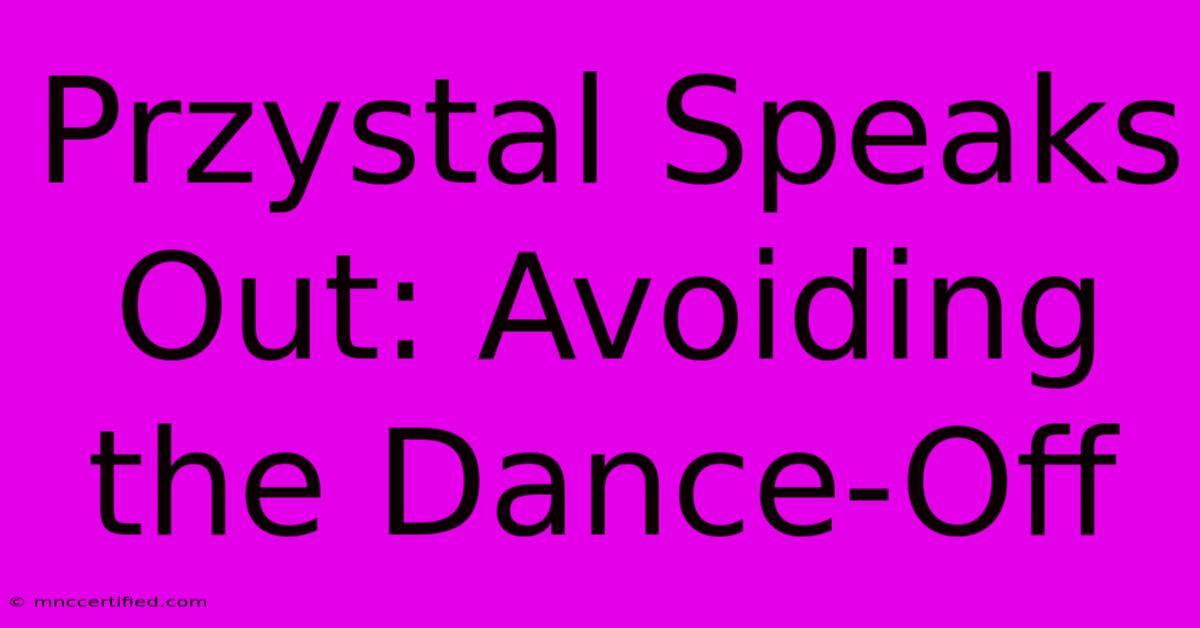Przystal Speaks Out: Avoiding The Dance-Off

Table of Contents
Przystal Speaks Out: Avoiding the Dance-Off – A Guide to Navigating Difficult Conversations
The dreaded "dance-off." We've all been there. That awkward, unproductive back-and-forth, where neither party truly listens, and the conversation spirals into negativity and nowhere near a resolution. This isn't just about petty disagreements; it can impact crucial professional relationships, family dynamics, and even romantic partnerships. This article, inspired by the insightful perspective of (fictional) expert, Przystal, offers a practical guide to gracefully sidestepping the dance-off and fostering constructive dialogue.
Understanding the Dance-Off Dynamic
Before we can avoid the dance-off, we need to understand what fuels it. Przystal identifies several key elements:
- Emotional Reactivity: This is the foundation of the dance-off. Instead of responding thoughtfully, we react emotionally, mirroring the other person's negativity, escalating the conflict.
- Defensive Posturing: Feeling attacked, we instinctively defend our positions, often without truly listening to the other person's perspective. This creates a cycle of accusations and counter-accusations.
- Lack of Empathy: Failing to understand or acknowledge the other person's feelings further fuels the fire. Without empathy, constructive conversation becomes impossible.
- Unclear Communication: Vague language, assumptions, and a lack of active listening contribute to misunderstandings and escalate the conflict.
Przystal's Proven Strategies for Avoiding the Dance-Off
Przystal’s approach centers on proactive communication and emotional regulation. Here are her key strategies:
1. Recognize and Regulate Your Emotions
This is paramount. Before engaging in a potentially difficult conversation, take a moment to identify your own feelings. Are you feeling angry, frustrated, hurt? Acknowledge these emotions without judgment. Employ techniques like deep breathing or mindfulness to calm yourself before responding. Emotional self-regulation is the first step to avoiding a reactive dance-off.
2. Active Listening: Truly Hear the Other Person
Active listening goes beyond simply hearing words. It involves paying close attention to both verbal and nonverbal cues, asking clarifying questions, and summarizing what you've heard to ensure understanding. Paraphrasing the other person's points shows you're listening and encourages them to feel heard.
3. Empathy and Validation: See Things From Their Perspective
Try to understand the other person's perspective, even if you don't agree with it. Acknowledging their feelings, even if you don't share them, can significantly de-escalate the situation. Phrases like, "I understand why you feel that way," or "That must have been frustrating," can go a long way.
4. Clear and Concise Communication: Choose Your Words Carefully
Avoid vague language and accusatory tones. Use "I" statements to express your feelings without blaming the other person. For example, instead of saying, "You always make me angry," try, "I feel angry when…" Clarity and respect are crucial for constructive dialogue.
5. Focus on Solutions, Not Blame: A Collaborative Approach
Shift the focus from assigning blame to finding solutions. Ask questions like, "What can we do to resolve this?" or "What would be a fair outcome for both of us?" Collaboration fosters a sense of teamwork and shared responsibility.
Beyond the Conversation: Long-Term Strategies
Avoiding the dance-off isn't a one-time fix; it's an ongoing process. Przystal suggests cultivating these long-term habits:
- Regular Check-ins: Schedule time for open communication, even when there's no immediate conflict. This helps build trust and prevent misunderstandings from escalating.
- Seek Professional Help: If you consistently struggle with difficult conversations, consider seeking guidance from a therapist or counselor. They can provide tools and strategies for improving communication and conflict resolution.
- Self-Reflection: Regularly reflect on your communication style and identify areas for improvement. Continuous self-improvement is key to building strong, healthy relationships.
By implementing Przystal’s strategies, you can significantly reduce the likelihood of engaging in unproductive dance-offs and build stronger, more fulfilling relationships in all aspects of your life. Remember, effective communication is a skill that can be learned and honed over time.

Thank you for visiting our website wich cover about Przystal Speaks Out: Avoiding The Dance-Off. We hope the information provided has been useful to you. Feel free to contact us if you have any questions or need further assistance. See you next time and dont miss to bookmark.
Featured Posts
-
Smolletts Conviction Reversed
Nov 22, 2024
-
Will Insurance Cover A Door Ding
Nov 22, 2024
-
E Coli Found Beef Patties Pulled
Nov 22, 2024
-
Smollett Conviction A New Chapter
Nov 22, 2024
-
Best Oura Ring Black Friday Deal
Nov 22, 2024